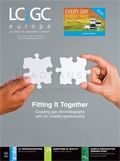The 18th International Symposium on Advances in Extraction Technologies and the 22nd International Symposium on Separation Sciences
The 18th International Symposium on Advances in Extraction Technologies (ExTech’2016) and the 22nd International Symposium on Separation Sciences (ISSS’2016) will be held at the Cultural and Congress Centre “Jordanki”, Torunˊ, Poland, from 3–6 July 2016.
Photo Credit: Maria Swärd/Getty Images

The 18th International Symposium on Advances in Extraction Technologies (ExTech’2016) and the 22nd International Symposium on Separation Sciences (ISSS’2016) will be held at the Cultural and Congress Centre “Jordanki”, TorunË, Poland, from 3–6 July 2016.
These important scientific events will be devoted to improvement of extraction techniques and modern separation techniques used in pharmaceutical, environmental, and food quality testing among others. Symposium topics will include theoretical and practical aspects concerning:
• Fundamentals and theory in separation sciences
• Advances in separation techniques and detection methods
• Chromatographic and electromigration techniques (TLC, HPLC/UHPLC, GC, CZE, ITP, FFF)
• Multidimensional and hyphenated techniques
• Sample preparation
• New extraction phases
• Miniaturization and automation (microfluidics, lab-on-a-chip, new devices and techniques)
• Applications (forensic, industrial, pharmaceutical, environmental)
• Food quality and safety
• Natural product analysis
• Life sciences, -omics, biomarker discovery
• Natural and synthetic polymers
• Validation and chemometrics
Co-organizers of the symposium include: the Polish Chemical Society, the Committee of Analytical Chemistry of the Polish Academy of Sciences, and the Nicolaus Copernicus University in TorunË.
The scientific program will include plenary and keynote lectures from invited speakers and oral and poster presentations from scientists working in the field of extraction techniques and separation sciences. Furthermore, a special issue of Analytica Chimica Acta, Journal of Chromatography A, or Talanta will be published featuring full-length peer-reviewed papers from the symposium.
In addition, manufacturers will be carrying out presentations during the symposium and an exhibition of equipment, columns, accessories, chemicals, and literature on various extraction and separation techniques will be held. Moreover, tutorial lectures and workshops concerning extraction techniques, sample preparation, food quality control, miniaturization, and application of hyphenation techniques will take place.
As a venue for a symposium TorunË is well situated in Central Europe and is accessible from major airports. As a city TorunË has a lot to offer with a long lasting tradition of political and scientific dialogue; it is notable for being the home of the famous astronomer, Nicolaus Copernicus. TorunË is also noted as the venue of two historical peace treaties in 1411 and 1466 between the Kingdom of Poland and the Teutonic Knights. Furthermore, in nearby WabrzezËno (Briesen), Walther Nernst, the founder of the basic theory of extraction, was born.
As the chairman of the symposium, the President of the Polish Chemical Society, and the Commissioner of the Chromatographic Analysis Society (PAS), I would like to invite you to visit our picturesque, gothic city - TorunË.
Prof. Dr. BogusÅaw Buszewski
E-mail: symposium@extech-isss2016.pl • Website: www.extech-isss2016.pl
Phone: (+48) (56) 6114308, 665 60 39 • Fax: (+48) (56) 6114837

New TRC Facility Accelerates Innovation and Delivery
April 25th 2025We’ve expanded our capabilities with a state-of-the-art, 200,000 sq ft TRC facility in Toronto, completed in 2024 and staffed by over 100 PhD- and MSc-level scientists. This investment enables the development of more innovative compounds, a broader catalogue and custom offering, and streamlined operations for faster delivery. • Our extensive range of over 100,000 high-quality research chemicals—including APIs, metabolites, and impurities in both native and stable isotope-labelled forms—provides essential tools for uncovering molecular disease mechanisms and exploring new opportunities for therapeutic intervention.
New Guide: Characterising Impurity Standards – What Defines “Good Enough?”
April 25th 2025Impurity reference standards (IRSs) are essential for accurately identifying and quantifying impurities in pharmaceutical development and manufacturing. Yet, with limited regulatory guidance on how much characterisation is truly required for different applications, selecting the right standard can be challenging. To help, LGC has developed a new interactive multimedia guide, packed with expert insights to support your decision-making and give you greater confidence when choosing the right IRS for your specific needs.

.png&w=3840&q=75)

.png&w=3840&q=75)



.png&w=3840&q=75)



.png&w=3840&q=75)










